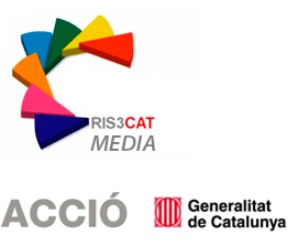UOC part of a project to create massive open online courses that analyse participants' emotions
The new NanoMOOCs research project will promote innovative learning experiences in areas such as nutrition, small business, health and tourism
Do people get bored during online courses? Which videos did they find most interesting? Do our faces show signs of anxiety when completing online assessment tests? Can we certify that a student has attained the applicable skills? Is it possible to include a course certificate as part of the curriculum? These are just some of the questions being posed by a NanoMOOCs research project being supported by the Universitat Oberta de Catalunya (UOC).
Specific content and short duration
NanoMOOCs are based on the concept of massive open online courses (MOOCs), which have burst onto the internet in the past few years and revolutionized the online learning arena. But where nanoMOOCs differ from MOOCs is that they focus on very specific content (one skill) and take place over a very short period of time (one week). "Our aim is to develop a series of short courses focused on attaining a basic, specific skill in a particular field. As a result of being open and online, the small MOOC, or nanoMOOC, represents the perfect format," says Teresa Sancho, full professor and a lead researcher in the Learning Analytics for Innovation and Knowledge Application in Higher Education (LAIKA) research group, which operates withing the UOC's Faculty of Computer Science, Multimedia and Telecommunications.
An innovative format that includes advanced technology modules, such as emotion recognition
Aside from their short timeframe, nanoMOOCs also integrate advanced technology modules, such as emotion recognition using computer vision techniques, and allow for blockchain certification and the application of artificial intelligence or advanced gamification, as well as the inclusion of high-quality content. NanoMOOCs, therefore, transcend traditional online courses and represent a new educational and training challenge that is relevant in a variety of markets.
The project, which is co-funded by ACCIÓ, includes the development of four pilot experiences within educational fields such as experiential tourism, nutrition and health, small and medium-sized commerce, STEM education, and transmedia production and consumption. In fact, a call is about to be opened for experts from the organizations involved in the project to begin developing nanoMOOCs.
"The UOC's collaboration involves the provision of the technological infrastructure and evaluation of the pilot projects from the perspective of learning analytics – the measurement, collection, analysis and presentation of student data and their contexts – as well as expertise with regard to the creation of content for the different pilot projects," said Sancho.
The companies participating in the project consortium view nanoMOOCs as elements able to add value to existing digital products or simply as potential new products or business areas to be exploited. The project's objectives therefore also include plans to devise models for the monetization of this new audiovisual format. In Sancho's words, "MOOCs have meant the mass-scale provision of access to knowledge in many fields and the rethinking of formats and methodologies for online learning."
Coordinated by Pompeu Fabra University (UPF), the NanoMOOCs project's participants include the UOC, the University of Barcelona (UB) and the Spanish National Research Council (CSIC), and representatives from the companies LavíniaNext, Edebé and Grupo Ormo. The initiative forms part of the RIS3CAT Media Community, which comprises 35 companies, the Catalan Government and technology and university centres associated with the cultural and creative industries sector. A total of eight projects will be funded over a three-year period (until 2023), focusing on a variety of areas, such as artificial intelligence, data analytics, hyper-personalization, cybersecurity and the development of new formats. The eight projects will receive a grant for the sum of €6 million from the Government of Catalonia to be administered through ACCIÓ.
In addition to Teresa Sancho, other participants from the UOC include Lluís Pastor, director of the eLearn Center, a UOC research centre; Joseph Hopkins, member of the Faculty of Arts and Humanities and the EDUL@B research group; Francesc Xavier Medina, full professor in the Faculty of Health Sciences and member of the FoodLab research group; Julià Minguillón, member of the Faculty of Computer Science, Multimedia and Telecommunications and the LAIKA research group; Francesc Santanach, from the eLearn Center's Technology for Learning; Laura Solanilla, member of the Faculty of Arts and Humanities and its IDENTICAT research group; and Eric Mesalles, from the R&I department's projects support staff.

Experts UOC
Press contact
-
Editorial department
